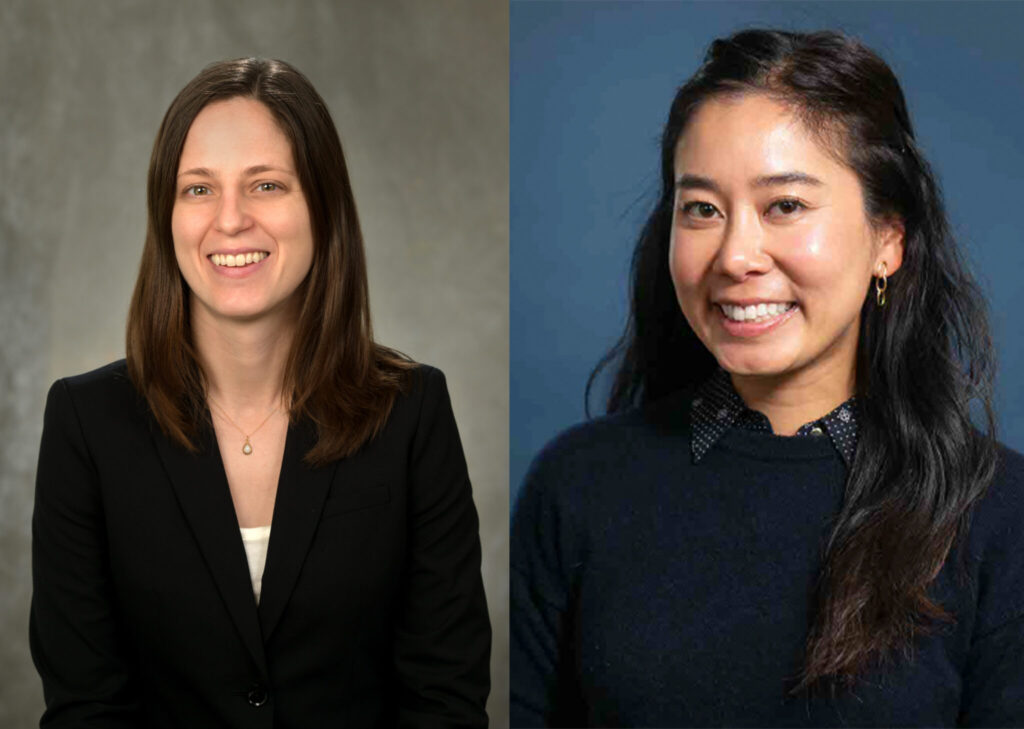
The SVS Foundation has awarded grants to two Society for Vascular Surgery (SVS) members to help them serve the underserved as part of the Vascular Care for the Underserved program—the initiative formerly known as VISTA (Vascular Volunteers In Service To All).
They are: Julia Glaser, MD, who is set to conduct two health fairs to screen attendees for vascular diseases (abdominal aortic aneurysms [AAAs], carotid disease and peripheral arterial disease [PAD]), as well as for PAD risk factors. She also will conduct a qualitative study to determine factors that cause patients with critical limb ischemia to delay seeking care.
And Tammy Nguyen, MD, who will look to address the limited access to preventative diabetes care and treatment for diabetic foot ulcers (DFUs) via mobile outreach clinics.
Julia Glaser
Glaser—an assistant professor of clinical surgery at Penn Medicine—works in Philadelphia, the United States’ seventh most populated city and one with a large high-poverty area, a high rate of diabetes and a disproportionately high rate of amputations.
“I see patients when amputation was all we could do for them,” she said. “And we wish we’d seen them six months earlier.”
She believes the city’s PAD burden is likely due to multiple factors in two main categories: lack of education and barriers to receiving care. Thus, her project includes both the health fairs and the qualitative research study to identify the barriers that prevent patients from seeking care earlier in the disease process.
“We want to raise awareness and see patients earlier, so we have something to talk about besides amputation,” she said.
The two health fairs would be held in early spring and late summer. Glaser anticipates each will reach 150 to 200 people, and will be held at churches in the west and southwestern Philadelphia areas. Multiple stations will screen individuals for vascular disease and for vascular disease risk factors, and offer information on hypertension, diabetes, PAD, AAAs, carotid disease and smoking cessation. Specialists in cardiology, vascular surgery, podiatry and primary care will be available.
The fair will include:
- AAA screening
- A quick carotid screening
- Ankle-brachial index
- Blood pressure reading
- A point-of-care hemoglobin A1c
Patients will receive the results, as well as care guidance, and will be encouraged to share the results with a primary care physician (including volunteers mailing the results at the fair). Information on primary care providers also will be provided.
The qualitative study will help Glaser get “a full picture of the reasons patients do not present to care in a timely manner,” she said. “I make a lot of assumptions about why people don’t seek care but what if I’m wrong? Maybe the truth is not that people don’t know they need care, but they can’t make appointments because they don’t have transportation. Maybe they’re afraid because a relative also had a similar slowly darkening toe or non-healing wound who ended up in the hospital for months, with sequential amputations before succumbing to heart disease.”
Study findings will help her make changes for the second fair, she said. “If a big problem is transportation, we’ll figure out ways to get people to me. We can have pamphlets outlining the transportation system. If smoking is an issue, we can have information on smoking cessation. We want to find out what’s preventing people from getting help.”
She said there is little existing literature on some of these delays in seeking care. She hopes her study will uncover the factors that may be missed in more traditional questionnaires written by healthcare professionals.
Glaser’s ultimate goal with her project? “I hope to put myself out of business.”
Tammy Nguyen
A major complication of poorly controlled diabetes is a DFU, which can lead to lower-extremity amputation. According to Nguyen, “Diabetes disproportionately affects more than 500,000 people suffering from homelessness or housing insecurities in the United States.”
The homeless and housing-insecure population has a critical need for comprehensive care to prevent, diagnose and treat diabetic foot wounds because of the limited access to healthcare facilities either due to financial or transportation issues, or perceived barriers to care, she said.
“Diabetic foot ulcers and non-healing wounds that lead to amputation have a profound effect on the homeless, impacting their ability to walk, maintain independence, and work,” she said.
“The goal of our project is to impact and empower the homeless and housing-insecure population through preventative education and providing a welcoming healthcare venue that encourages diabetic foot care access and treatment.
“Patients understand the severe ramifications of an amputation and that they don’t want that happening to them. To prevent amputation, it’s our role as vascular surgeons to be better educators and help people advocate for themselves.”
The project is a pioneering approach to community outreach that is tailor-fit to address the unique needs of a disadvantaged community by improving access to multidisciplinary diabetic foot care in collaboration with local community facilities that already provide existing care to that population.
As Nguyen outlines, “By providing access to multidisciplinary diabetic foot care in a forum that is familiar and accepted by our focus population, this allows us to bridge any distrust these marginalized communities may have with the medical profession. We are essentially meeting them where they are.”
For example, at one event in the parking lot at the YMCA, a homeless man stood by, watching the mobile diabetic foot screening community outreach clinic for several hours, Nguyen related. Many volunteers asked him to register, but he refused, preferring to observe. At the end of the clinic, as volunteers packed up, he finally approached them and asked to be evaluated. He eventually told the volunteers of his prior bad experiences with doctors who, he said, “gave him meds he didn’t need and wouldn’t listen to him.” He told the volunteers he had a different view of them, calling them “good people who were just there to help,” said Nguyen.
“This interaction gave me insight into the psyche of the population we are trying to serve. Some people suffering from homelessness or housing insecurities may have had negative experiences with healthcare and are afraid or wary to seek help, even though they know where to go. Our presence in the community helps break down that barrier,” she said.
The mobile diabetic foot screening community outreach clinics combine essential features of two different establishments, she said: “The multidisciplinary resources of large academic hospitals (UMass Medical Center) with the accessibility of established community centers. By combining these two establishments over the past two years, UMass Medical Center and local trusted community centers, we have been able to successfully create mobile diabetic foot screening community outreach clinics.”
The Vascular Care for the Underserved project will build on the experience of the previous five clinics. Each clinic provides not only core diabetic foot services, including vascular surgery, vascular non-invasive studies, diabetes, and podiatry, but also dermatology, ophthalmology, addiction behavioral health, and even COVID-19 vaccinations to an average of 40–50 homeless and housing-insecure participants at each event.
In addition to expanding the mobile diabetic foot screening community outreach clinics, the new project will also focus on identifying the specific barriers to care, how to systematically address these barriers, and provide follow-up care to the homeless and housing-insecure population identified.
In addition to this award, Nguyen also received the 2022 Vascular Cures Wylie Scholar Award and National Institute of Diabetes and Digestive and Kidney Diseases (NIDDK) K08 grant, which also will focus on non-healing DFUs. For that project, she will research how diabetes affects the immune system and how that, in turn, affects wound-healing.












